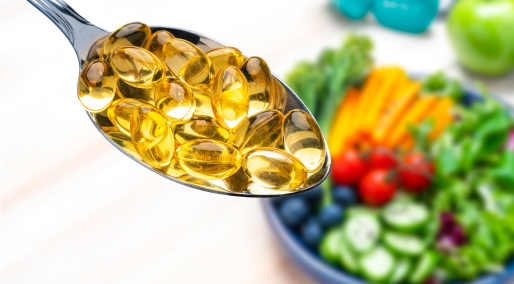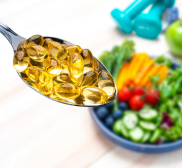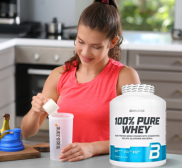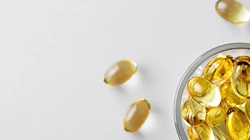.webp)
.webp)

Patryk Chodyniecki
Cod-liver oil for a child
- Are essential fatty acids safe for children?
- When can children be given cod liver oil?
- What are the health benefits of consuming fish oil ?
- Possible side effects of fish oil in children
- When to avoid fresh Atlantic cod liver oil ?
- How to get your child to eat cod liver oil ?
- Cod liver oil and the fatty acids it contains
- Child dosage
- Sources of fish oil
- What you need to know before you buy cod liver oil for children?
- Take advantage of the discount
Regular consumption of fish is associated with optimal intake of omega-3 3. However, in cases where fish intake is negligible or infrequent, supplementation may be helpful. One such supplement is fish oil, commonly known as cod liver oil. But can it be given to children? In this article, we will discuss whether it is safe to give cod liver oil to children, what it looks like when used in infants, and what health benefits it brings to the whole body.
Are essential fatty acids safe for children?
The U.S. Food and Drug Administration (FDA) has designated fish oil as a “generally recognized as safe (GRAS) food ”. The safe intake limit is three grams per day for adults. In general, children under one year old need 0.5 grams of omega-3 fatty acids per day
When can children be given cod liver oil?
According to the American Academy of Pediatrics (AAP), within a few months of starting solid food, an infant's daily diet should include a variety of foods, including fish. However, it is not known whether this rule also applies to cod liver oil. If your child regularly eats fish and is fine with it, fish oil may also be suitable for them. Moderate consumption of fish at regular intervals should be able to meet your child's nutritional needs for omega-3 fatty acids. But if you want to start giving your child cod liver oil, it is mandatory to consult a pediatrician beforehand.
What are the health benefits of consuming fish oil ?
Fish oil is obtained from fatty fish tissues. An example of fish oil is, for example, cod liver oil, which is obtained, as the name suggests, from cod liver, commonly recognized as an oily fish. The oil is an excellent source of omega-3 fatty acids, such as EPA (eicosapentaenoic acid) and DHA (docosahexaenoic acid), which the body cannot synthesize. Here are some of the benefits of consuming cod liver oil:
- Brain and cognitive development - komega-3 fatty acids such as EPA and DHA are required for proper brain and cognitive development in infants. In particular, DHA deficiency is associated with poor cognitive development leading to learning disabilities, so supplementing a child's diet with fish oil, after consulting a doctor, may help.
- Eye development - various scientific studies have shown that omega-3 fatty acids, such as DHA, may be beneficial in supporting optimal vision development. In addition, DHA can help preserve vision and fight chronic eyelid inflammation in the long run.
- Healthy Heart - rregular consumption of fish oils may have a protective effect on the heart. Omega-3 may possibly lower blood pressure and improve blood vessel health. In addition, fatty acids are known to reduce triglycerides and slow down plaque buildup. These benefits can make a difference to your child in the long run.
- Resistance - sDHA has been claimed to have immune-enhancing properties. Omega-3 fatty acids also have anti-inflammatory effects that play an important role in boosting immunity.
- Healthy bones - nSome studies show that regular consumption of fish oil may have a protective effect on bones, and fish oil supplements may help reduce joint pain and stiffness. Fish oil also contains vitamin D, which helps maintain healthy bones.
- Skincare - susing fish oil has shown a beneficial effect on skin development. It is believed that fish oil can reduce the severity of some skin conditions, such as eczema and dermatitis. These benefits are attributed to its omega-3 and omega-6 fatty acids.
- Improving overall health - oexcept omega-3 fatty acids, fish oil contains other micronutrients such as iodine, selenium, vitamins A and D and bioactive compounds. These compounds help maintain health and well-being with regular consumption. All the benefits of fish oil are part of a well-balanced diet for a child.
- May relieve ADHD symptoms - zAttention Deficit Hyperactivity Disorder, commonly known as ADHD, is a common condition associated with symptoms such as hyperactivity, impulsiveness and difficulty concentrating. Some research indicates that omega-3 supplements may help reduce ADHD symptoms in children. A number of studies have shown that omega-3 fatty acids improve memory, attention and learning. A multi-week study of 79 boys showed that taking 1,300 mg of omega-3s a day improved concentration in people with ADHD. Moreover, after more than 52 studies, dietary modifications and fish oil were found to be the two most promising techniques for reducing ADHD symptoms in children
- May reduce asthma symptoms - aStma is a chronic disease that affects children and adults, causing symptoms such as chest pain, difficulty breathing, coughing and wheezing. Some studies have shown that omega-3 fatty acid supplements help relieve these symptoms. For example, a 10-month study in 29 children found that taking a fish oil capsule containing 120 mg a day of combined DHA and EPA helped reduce asthma symptoms. Another study of 135 children found a link between higher consumption of omega-3 fatty acids and a reduction in asthma symptoms caused by indoor air pollution.
- Promote better sleep - Sleep disorders affect almost 4% of children under the age of 18. One study in 395 children linked lower levels of omega-3 fatty acids in the blood to a higher risk of sleep problems. It was also found that supplementing with 600 mg of DHA for 16 weeks reduced sleep interruptions and led to almost 1 hour more sleep per night. Other research suggests that consuming more omega-3 fatty acids during pregnancy may improve sleep patterns in infants.
Possible side effects of fish oil in children
Here are some of the possible side effects of fish oil:
- General discomfort - oFish hopper has some general side effects such as bad taste in mouth, bad breath, smelly sweat and headache. These side effects are mild and may or may not affect all children. Some children may also experience gastrointestinal problems such as heartburn, nausea and diarrhea.
- Possible drug interaction - ofish oil sometimes interacts with medications, so if your child is taking medication, discuss with your pediatrician about cod liver oil intake beforehand.
- Harmful ingredients - nsome fish oil supplements may contain added substances that may not be suitable for infants. The choice of fish oil supplement should be made in consultation with a pediatrician.
- Allergy - nan infant allergic to seafood may also be allergic to fish. Some of the primary symptoms of a fish allergy are headache, nausea, stomach cramps, indigestion, stuffy or runny nose, and anaphylaxis. If your child has a seafood allergy or any other pre-existing allergy, consult a pediatrician before giving fish oil or a fish oil supplement.
- Overdose - whigh doses of fish oil supplementation are associated with decreased immunity, increased anticoagulant activity and toxicity. If your child shows any unusual symptoms after consuming a fish oil supplement, discontinue use and seek immediate medical attention.
When to avoid fresh Atlantic cod liver oil ?
Avoid fish oil if your child:
-
has a medical condition, especially a blood disorder,
-
is allergic to fish or seafood,
-
is taking antiplatelet drugs or other medications that may be less effective in the presence of fish oil.
How to get your child to eat cod liver oil ?
Introducing cod liver oil into your daily diet may not be easy as children may not like its taste. Here are some tips on how to change it:
- Try offering flavored fish oil - flavor can help mask the smell fish, so mix flavored fish oil with applesauce or any of your child's favorite treats.
-
Add fish oil to a bottle of milk, soft oatmeal, smoothie or yogurt.
-
Sprinkle the vegetable puree with fish oil.
-
Once your child starts chewing, you can opt for chewing fish oil supplements.
-
You can also try baby foods fortified with fish oil when your baby grows up.
Cod liver oil and the fatty acids it contains
Both children and adults need vitamins, minerals and other nutrients to maintain a healthy, functioning body. For children, these nutrients are also used for vital growth and development. Like other important nutrients for growth and development (such as vitamin D, iron and calcium), babies need omega-3 fatty acids. Omega-3 fatty acids come in three forms:
-
ALA (alpha-linolenic acid),
-
EPA (eicosapentaenoic acid),
-
DHA (docosahexaenoic acid).
ALA is found in vegetable oils. Foods such as walnuts, soybeans, flaxseeds, hemp seeds, and chia seeds are all good sources of ALA. EPA and DHA are found primarily in oily fish, but can also be obtained from eating other seafood and even some algae.
ALA is called “essential fatty acid”. Our body is unable to produce ALA on its own, which means we must obtain it from food sources. EPA and DHA can be made in our bodies from ALA, but the process is inefficient.
Child dosage
Daily need for omega-3 depends on age and gender. If you use supplements, be sure to follow the instructions on the package. It is worth noting that ALA is the only omega-3 fatty acid with specific dosage guidelines. The recommended daily intake of ALA in children, depending on age, is:
-
0-12 months: 0.5 gram,
-
1-3 years: 0.7 grams,
-
4-8 years: 0.9 grams.
Gender data looks like this:
-
girls 9–13: 1.0 gram,
-
boys 9–13 years: 1.2 grams,
-
girls 14-18: 1.1 grams,
-
boys 14-18: 1.6 grams.
Generally, 120-1300 mg of combined DHA and EPA per day is beneficial for children. Still, to prevent any adverse effects, it's best to consult your doctor before starting any supplements for your child.
Sources of fish oil
You can get DHA and EPA from several food sources, including:
- cod liver oil,
- oily fish e.g. herring, rainbow trout, mackerel, salmon, tuna and sardines, which have the highest levels of DHA and EPA,
- other fish e.g. pollock, flounder, scallops, clams , shrimp, catfish, canned albacore, canned light tuna and fish fingers have less DHA and EPA than oily fish, but most importantly, they have them in the composition,
- DHA-fortified foods and drinks.
If you plan to supplement with DHA-enriched foods, remember that found in fortified foods are probably less than in a serving of oily fish. If your child eats regularly, the amount can add up. Also, be sure to add this amount to your total daily intake if you are considering offering an additional fish oil supplement.
Below are the products that have the highest amount of omega 3 acids
| Type of fat | Energy Value | Omega−3 | Omega−6 | 3/6 Ratio |
|---|---|---|---|---|
| Salmon oil | 123 | 5182 | 302 | 17.16 |
| Cod liver oil (cod liver oil) | 123 | 2811 | 254 | 11.07 |
| Herring oil | 123 | 1926 | 195 | 9.88 |
| Sardine oil | 123 | 3688 | 513 | 7.19 |
| Perilla oil | 120 | 8960 | 1680 | 5.33 |
| linseed oil | 120 | 7980 | 2240 | 3.56 |
| Anhydrous butter | 112 | 185 | 288 | 0.64 |
| Turnella oil. low eruk | 124 | 1302 | 2842 | 0.46 |
| Red mustard oil | 124 | 826 | 2146 | 0.38 |
| Walnut oil | 120 | 1414 | 7194 | 0.20 |
| Soybean oil | 120 | 925 | 6936 | 0.13 |
| Wheat germ oil | 120 | 938 | 7453 | 0.13 |
| Homemade lard | 115 | 141 | 1242 | 0.11 |
| Olive oil | 119 | 81 | 1067 | 0.08 |
| Hydrogenated soybean oil | 120 | 354 | 4746 | 0.07 |
| Shea butter | 120 | 41 | 1414 | 0.20 |
| Soybean oil | 120 | 925 | 6936 | 0.13 |
| Wheat germ oil | 120 | 938 | 7453 | 0.13 |
| Homemade lard | 115 | 141 | 1242 | 0.11 |
| Olive oil | 119 | 81 | 1067 | 0.08 |
| Hydrogenated soybean oil | 120 | 354 | 4746 | 0.07 |
| Shea butter | 120 | 41 | 666 | 0.06 |
| Soy mayonnaise | 99 | 414 | 7176 | 0.06 |
| Industrial lard | 115 | 128 | 2317 | 0.06 |
| Sunflower oil | 124 | 27 | 505 | 0.05 |
| Rice bran oil | 120 | 120 | 218 | 0.05 |
| Cocoa butter | 120 | 14 | 381 | 0.04 |
| Palm oil | 120 | 27 | 1238 | 0.02 |
| Corn oil | 120 | 95 | 7888 | 0.01 |
| Sesame oil | 120 | 41 | 5617 | 0.01 |
| Cotton oil | 120 | 27 | 7018 | 0.00 |
| Grape seed oil | 120 | 14 | 9466 | 0.00 |
| Peanut oil | 119 | 0 | 4320 | 0.00 |
| Coconut oil | 117 | 0 | 245 | 0.00 |
What you need to know before you buy cod liver oil for children?
When talking about buying fish oil, fish oil supplements or other products with DHA, ALA, DHA fortified foods, and having taking into account the risk associated with mercury in fish, it turns out that the topic is not as simple as it may seem. Here are some important things to keep in mind when buying cod liver oil:
- Choose supplements carefully - jif you choose to include a supplement in your child's routine, look for a fish oil supplement or an omega-3 supplement that contains both DHA and EPA if you want to get the possible benefits of fish oil. Consider a variety of sources and remember that the fishy taste of some fish oil supplements is often masked by other flavor ingredients. Be sure to read the label before purchasing.
- Be aware of allergies - ndo not give your children fish oil supplements if they are allergic to fish or shellfish.
- Understand components - komega-3 fatty acids are essential fatty acids. This means that our body cannot produce them on its own and must get them from our diet, either from the foods we eat and drink, or from supplements. There is no % Daily Value for DHA, EPA or ALA. This is even if you see them on some food or supplement labels. However, there is an adequate supply of omega-3 fatty acids for children. These numbers include ALA, DHA and EPA in one recommendation.
- Consider environmental impact - nresearchers have begun to study the environmental impact of overfishing smaller fish to produce fish oil supplements. This can often be found on the websites of individual brands. Do a quick search before making a purchase as data changes as catches change
Baby cod liver oil contains essential fatty acids, vitamin d, folic acid, vitamin d, high concentration of triglycerides and many others. When choosing cod liver oil for your child, it is worth making sure that the composition of the cod liver oil is detailed. Appropriate supplementation with such a product strengthens the body's immunity and has healing properties in states of reduced immunity.
Take advantage of the discount:
www.webmd.com - Omega 3 fatty acids fact sheet
www.healthline.com - 17 health benefits of omega-3
www.childrensnutrition.co.uk - Omega-3 for kids
J.H. Christensen i inni, Effect of fish oil on heart rate variability in survivors of myocardial infarction: a double blind randomised controlled trial, „British Medical Journal”, 312 (7032), 1996, s. 677–678
Rate the text

Patryk Chodyniecki








.png)

















